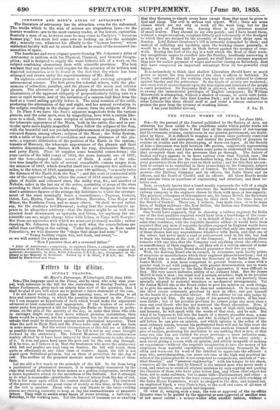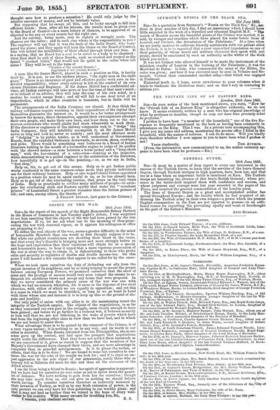THE PUBLIC WORKS OF INDIA.
1st June 1855.
Sin—By the perusal of the Journal published by the Society of Arta, my attention has been called to the conditions under which public works are pursued in India; and there I find that all the absurdities of red-tapeism and Government routine, conspicuous in our general government, are multi- plied by three. It is difficult to imagine a system more perfectly contrived to defeat all skill and enterprise, and destroy the possibility of progress by routine on routine and the stereotyping of worn-out types. At the Society of Arts a discussion was held between to parties, respectively representing canals and railways; and I have taken some pains to understand the interests that prompted them and the processes they go through. The history of Indian railways appears to be more curious even than English ones ; the comfortable difference for the shareholders being, that the East India Com- pany guarantees them five per cent on their outlay ; and for this they are con- tent to submit to be controlled in their proceedings by the Company, subject also to another control—the Board of Control. So there are three distinct powers—the Railway Company and its officers, the India Board and its officers, and the Board of Control and its officers. All these Boards decide and exercise vetos on questions of engineering and structure, and their re- lative cost.
Now, everybody knows that a board mostly represents the Will of a single individuaL In engineering and structure the individual representing the railway company is the engineer chosen by them with more or less sagacity. The practical colleagues of this engineer are, Sir James Melvil, the Secretary of the India House, and whoever may be chief clerk for the time being of the Board of Control. There are, I believe, four main lines, or to be main lines, of Indian railways—the East Indian, the Indian and Peninsular, the Bombay and Baroda, and the Scinde. One would have supposed, that in choosing a railway engineer for India one of the first qualities required would have been a knowledge of the coun- try from actual residence therein ; or in default of that—i. e. in default of a some time residence, with the requisite faculties added—it would have been required that any man of requisite faculties engaged in England would have been required to proceed to India. But it appears that only one engineer out of those chosen had any acquaintance whatever with India, and that one of the others had never made a road or rail-covered road in his life, but had to learn his business at the cost of the Company. I am not making these remarks with any idea that the Company care anything about the efficiency or nonefficiency of their engineer ; all they ask is a certain amount of name as a reason why the India Board should guarantee their five per cent. Well, the Railway Board sits in council, to determine upon knotty points
of structure or manufactures which their engineer places before them; and at that Board sits as ex-officio Director the Secretary of the India House, Sir James Melvil. A man more competent to general business, a man with a greater wish to set with judgment, with greater determination not to waste the shareholders' money or the India Board's guarantee, it were difficult to find. His very aspect indicates ability of no ordinary kind. But Sir James Melvil is only a man ; his mind is of a certain structure, high in its peculiar aptitudes, but the aptitudes by which he is known are not precisely those specially adapted to material structure or mechanical arrangements. Yet Sir James Melvil sits at the Board either to give his opinion on such things, or to give his sanction to what he does not understand. Or he must take the third course commonly practised by men in office, and put himself in the hands of a professional adviser. Of this adviser he can only judge by what people tell him. He may judge of his general faculties, of his busi- ness habits; but of his peculiar province he cannot judge any more than a man can read Greek who has not mastered the Greek characters. Now, if it should so happen that he falls in with a man of high skill, intelligence, and honesty, he will speak with the words of that man, and be safe. But what if he happens to fall into the hands of a merely plausible man, a man of absolutely no sound knowledge, and who is obliged to get crammed him- self before he can give an opinion, and which opinion is the reflex of the most ordinary minds, because his professional fears will not let him trust the man of higher skill? And this plausible man shelters himself under the plea of caution, professing his resolution to use nothing that is new, or that some one else has not verified for years previous—a mere imitative man, empirically working to avoid responsibility, and get his salary safely : a man never giving a reason with an opinion, and utterly incapable of making an experiment—without the requisite imagination to save the money of his employers from wasteful expenditure, and squandering thousands in the effete and worn-out for want of the intellect to appreciate the efficient : a man who, notwithstanding, can sneer sub rose at the high and practical in- tellect of the philosopher he is not competent to comprehend, and talk of "un- tried theories" and "amateur engineering," with his tongue in his cheek, conscious all the time that he himself is the untried man who never made a road, and resolves to avoid all original mistakes by only copying and 9uoting the blunders of those who have gone before him, and whose chief object has been, not to make railways, but to make bills—Parliamentary and other : a man who if turned over to the keen cross-questioning and shell-cracking of the India House Examiners, would be stripped to the skin, and turned out, an unplumed biped, a very Plato's bird, to the scoff and scorn of all men of eompetent intellect, 85 a quack and impostor. . Or what if eseapIng shah a man, the veto or approval of the ex-ofiltdo Director were to be guided by the approval or nozi.approval of &nether SIMI Of low moral calibre ; a monerwaster after another fashion, without a
thought save how to produce a sensation ? He could only judge by the relative amounts of money, and not by intrinsic value. But supposing that he escape all this, and be lucky enough to fall into efficient hands : then, after all his labours, the results must be given over to the Board of Control—to a mere lottery of chances, to be approved of or objected to for any or every reason but the right one. And the railway, being made, may be rightly or wrongly made. The chances are the latter ; and in such case where is the responsibility to rest The engineer will say that it was the fault of the India Board, who ham- pered his plans; and they again will turn the blame on the Board of Control, who will defend the infallibility of their official through thick and thin. It is a saying, that no Board has a soul to be saved or a body to be chastised: what then shall be said of three Boards, each as crooked and warped as the famed "crooked billet," that would not lie quiet in the cellar when left alone ? They will be set to the tune of
"Carlies o' the cruckit Boards ! Ingrained a' wP cruckit words."
A man like Sir James Melvil, placed in such a position as this, is hardly dealt by. It is not, to use the modern phrase, "the right man in the right place." There is no insurance of good and effective public work save in un- divided responsibility, where every railway is left to the control of its own chosen Directors and Engineer. If Sir James Melvil has a confidential ad- viser, all Indian railways will take more or less the tone of that man's mind ; or in default of an adviser, they will take the tone of his own mind, in a routine he cannot escape from ; and all will fall to one dead level of an imperfection, which in other countries is transient, but in India will be permanent. The arrangements of the India Company are absurd. If they think the railway coMpanies require watching in their expenditure of the capital they themselves guarantee the interest on, it would be a far better arrangement to borrow the money, direct themselves, appoint their own engineers amongst their own people, and make their own lines, and lease them out to the nu- merous contractors who would gladly find stock wherewith to work them. If the directors or engineers of the railway companies seek to " dodge " the India Company, they will infallibly accomplish it, sit Sir James }Idyll never so long and look he never so acutely ; and the most effectual mode of "dodging" is by public tender, as is well understood at Government Boards, from the exploded Ordnance downwards, to shovels, shoes, crowbars, and picks. There would be something very ludicrous in a Board of Indian Directors looking in the mouth of a locomotive engine to judge of its quality with the shrewd maker—a cross between a horse-jockey and a "long-shore man," with the bar-sinister of a coke-oven—winking at the inspector, while demonstrating to a gulled engineer to the satisfaction of the Directors, bow beautifully it is got up—in the painting,—or, as we say in India, "first chop." Help us, Sir, to get out of this scrape. Help us to get Indian public works conducted in the same common-sense mode that private individuals use for their ordinary business. Help us also to get Colonel Cotton appointed to a position where he may be again useful to us, as he has already been. Help us to get rid of this everlasting routine, that preys on the very vitals of India. Help us practically to civilize many millions of people—to extir- pate the everlasting sloth and Eastern apathy that make the "merchant princes" of Leadenhall Street a greater nuisance than the Indian princes of old ; and earn, among others, the thanks of
A YELLOW INDIAN, (not gone to the Crimea.)



































 Previous page
Previous page